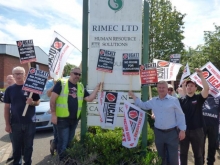Work TV
Watch our TV Channel dedicated to the ‘World of Work’. Explore our video library for informative videos featuring career opportunities at leading companies, franchising opportunities, further education and recruitment professions and their services.
Simon Collyer
Remploy Disabled Jobs Dissapointment
Only a little over half of disabled ex-Remploy employees in Wales are now in work, according to figures obtained by Plaid Cymru.
The UK Department of Work and Pensions said that the nine Welsh factories which shut between 2010 and 2013 employed 421 people at the time of closure. But the DWP said that just 226 were now recorded as being in work, a Freedom of Information request reveals.
The factories which closed under the Tory-Liberal Democrat Coalition were in Aberdare, Abertillery, Bridgend, Croespenmaen, near Blackwood, Merthyr Tydfil, Neath, Porth, Swansea and Wrexham.
In addition, three factories at Brynaman, Treforest and Ystradgynlais were closed under the last Labour Government. A total of 144 jobs were lost, although the DWP said it did not have data on how many of those employees had found work.
Remploy factories made items ranging from furniture and wheelchairs to the refurbishment of computers.

Lindsay Whittle, Plaid Cymru’s Equality Spokesperson and South Wales East AM, said: “These closures were an attack on disabled people and despite all the promises made by the UK Government almost a half of those what were employed at Remploy factories are no longer working.
“There is always a cost to providing sheltered employment and sadly many disabled people have paid the price for cost cutting by the UK Government. The closure programme that began under the last Labour Government has left many disabled people out of work and considerably worse off as a result. The Treasury is also unlikely to have saved money because they would have to pay benefits.”

The Euro Facts and Figures
The euro (EUR) is the official currency of the eurozone, which consists of 19 of the 28 member states of the European Union: Austria, Belgium, Cyprus, Estonia, Finland, France, Germany, Greece, Ireland, Italy, Latvia, Lithuania, Luxembourg, Malta, the Netherlands,Portugal, Slovakia, Slovenia, and Spain.
The currency is also officially used by the institutions of the European Union and four other European countries, as well as unilaterally by two others, and is consequently used daily by some 337 million Europeans as of 2015. Outside of Europe, a number of overseas territories of EU members also use the euro as their currency.
This report is interesting if you are thinking of working abroad or even having a holiday.

Information source: Wikipedia
Please download he report below:
Historic Moment as Irish Capacity Bill Passes All Stages
Labour Senator Mary Moran has said the passing of the Assisted Decision Making Bill in the Seanad on Tuesday and in the Dáil today marks a historic point in the fight for equality.
Senator Moran stated: “The Assisted Decision Making (Capacity) Bill is one of the most important and complex pieces of legislation to pass through the Houses of the Oireachtas in many years.
“With the passing of this legislation through both Houses we are now one step closer to ratifying the United Nations Convention on the Rights of Persons with Disabilities. A goal which is foremost in my work as a Senator, and one in which I am striving to meet day in and day out.
“I welcome that at long last the words ‘lunatic’ and ‘imbecile’ will be removed from our legislation as a result of the Bill and everyone will be afforded the respect they deserve and are entitled to in our statute books.
'It is hoped that the Bill will be signed into law by President Higgins before the end of this year. I will then work to see the speedy implementation of the necessary framework so that this legislation may come into full force as soon as is practicable.
“The Assisted Decision Making (Capacity) Bill will make a direct impact on the lives of so many individuals across the country. It has been my pleasure to work with my colleague, Minister Kathleen Lynch on this legislation along with parents, individuals and organisations including Inclusion Ireland.
“When I became a Senator I made a commitment to advocate on behalf of people with a disability and their families. More than anything else I wanted to see this legislation pass so that individuals who may have decreased capacity at whatever stage of life may be provided for when necessary. This is a historic and happy moment for everyone through the decades who has worked to see this legislation come to pass.”
Hands off the House of Lords
David Cameron is preparing to use the full force of the law to clip the wings of the House of Lords after it blocked his welfare cuts. The House of Lords were in fact representing public opinion and the opposotion by the majority. Thse were changes the public did not want.
The ABC have just started a petition:
Hands off the House of Lords" and wanted to see if you could help by adding your name.
My initial goal is to reach 100 signatures and I need more support. You can read more and sign the petition here:
https://www.change.org/p/simon-collyer-hands-off-the-house-of-lords?recruiter=366395488&utm_source=share_petition&utm_medium=email&utm_campaign=share_email_responsive
Take it away, the one and only and sadly missed: Rory Gallagher
EU Wide Social Dumping Scandal
RTE, the Irish broadcaster, has a fascinating radio documentary about questionable firms and strange justice. Bogdan Chain is a Polish worker recruited by an Irish company Atlanco (registered in Cyprus to reduce its social and tax costs) to work in skilled manual labor jobs in places like Finland and Norway. In March this year a case known as Bogdan Chain vs Atlanco reached Europe’s highest court, on the issue of where employers and workers should pay social insurance. The only problem? Chain knew absolutely nothing about the case. It seems the Irish recruitment agency created a false lawsuit and hired a Belgian law firm to represent Chain without his consent. Tony Connelly, Europe editor for RTE, who tipped me off about this story, will continue to follow the many unanswered questions of the case. LISTEN: http://bit.ly/1m92CdS
Here is the story in full. You can watch a Scottish Parliament video on Zero Hour Contracts and unusual working practises below.
An Irish company with an address in Rathmines has found itself at the centre of fresh allegations of Europe wide blacklisting in the construction sector and has been accused of “modern day slavery” by senior UK union officials.
Blacklisting is the practice of blocking those perceived as union activists or agitators from being hired. The long suspected practice of blacklisting emerged solidly into the spotlight in 2009. When the UK Information Commissioners Office (ICO) seized a Consulting Association database of over 3,000 construction workers which was used by 44 companies to vet new recruits.
Yesterday, trade unionists raised fresh concerns at the Scottish Affairs Select Committee arising from claims about the existence of another blacklist made in a Danish documentary last May.
The Dublin based company Atlanco Rimec, featured in the documentary investigation by Denmark’s national broadcaster DR. The station accused the company, which has thousands of construction workers employed on short-term contracts throughout Europe, of keeping a secret register of workers, charting their behaviour and their union dealings.
The hearings take place against the backdrop of a decision by the the London High Court to combine four legal cases brought on behalf of employees who appeared on previous black lists subscribed to by many of the UK’s largest contractors.
Justin Bowden, of the GMB union, named and shamed Atlanco Rimec as “contemporary blacklisters”. The GMB describes itself as “Britain’s General Union” and consists of over 700,000 members. It was involved in massive strike actions in local authorities and schools earlier this month over conditions and pay.
The GMB brought a three page report to the table. rabble has received this report. Speaking towards the end of the MP probe, Justin Bowden said:
“We can look you in the eye with all confidence and say with all confidence that they have been undertaking blacklisting of workers in the extremely recent past. In terms of what or who they are, they are an agency, a temporary employment broker would be another way of describing them. They are a very large and sophisticated company which is made up of a web of some sixty plus companies, actually it’s probably 70 – 80 including those that they close down, they open them up and close them down as they accumulate debt or the issues become too great. Many of the share holding companies you’d be surprised to hear are based in Jersey. The financial officer of several of the companies…someone called Catherine Foy has admitted to DR, the Danish national broadcaster that it does keep a register of its workers.”
Atlanco Rimec was founded in 1994 by Micheal O’Shea. He was listed on the Irish Independent’s rich list for 2014, where his worth was valued at €65 million. He’s described by the Indo as “low-profile private equity baron,” who is said to have moved to Geneva.
The committee yesterday was told how they had 500,000 employees across their web of companies, Bowden summed up his view of their business model to the hearing before reading in several examples of comments on the register.
“It’s model basically is bidding on contracts at northern European prices in simple terms and employing labour at Southern European and Eastern European rates from those countries. They then cream the bit out of the middle and frequently cream tax and national insurance to boot on the back of that too.”
In the documentary, the station reported it had photographed the secret register operated by the company. It went as far as to claim its existence was confirmed by a former manager who told them on the condition of anonymity that:
“Atlanco Rimec does not tolerate workers who have dealings with unions. That is a complete no-no in the company because unions can cause a lot of problems.”
In Denmark the agency provided flexible labour for construction projects such as the Copenhagen Metro. In one extract from the Danish TV doc forwarded to rabble, a former higher up employee in Atlanco Rimec said:
“I’m afraid, everybody’s afraid of Michael O’Shea. Michael O’Shea has vast sums of money, he can use that money he has to cause trouble financially or physically. They have a genuine fear of Mike, they know him, they know what he’s capable of.”
He also stated that:
“If a worker wants to get a union involved, that worker will never work for Atlanco again. We can’t have workers in contact with the unions, it’s basically forbidden within the company, simply because if the union get involved and the union are provided with information, they will simply cause problems.”
The register is said to grade workers on ability, attendance, time keeping and attitude. One example of comments about a UK based worker read:
“This guy is the absolute worst category of trouble maker you could possibly find. He is a union representative and very militant. He was the main cause of the strike in Langage on the 7th August. I would never re-employ person again.”
The company is no stranger to controversy. Last year, a journalist called Rob Fox working for the regional De Limburger got a tip that Portuguese workers were being deducted €968.75 a month for so called “logistic costs” while working on a tunnel project.
The European Federation of Building and Woodworkers detailed this case, of what it called “social dumping” during the construction of the A2 highway in Maastricht. The federation’s website described how:
“During their stay in the Netherlands, the posted workers have been living in rented houses which were due to be demolished. Each worker had to pay a monthly rent of 968.75 Euro to Atlanco Rimec, despite the dilapidated state of the houses. The sum was directly deducted from 35 workers’ monthly salaries, under the guise of “logistical costs”. Three to four workers lived in a house. In this way Atlanco Rimec cashed in a minimum rent of 3,000 Euro per month, for each house which was due to be demolished. Thus, in total the company deducted each year at least 400,000 Euro directly from the workers’ salaries. Meanwhile, it was discovered that the owner of the houses, a Dutch housing corporation, rented out 14 houses for 350 Euro per month to Atlanco Rimec, which is a normal sub-market rent for a house which is not maintained and which is ready to be demolished.”
The company was also at the centre of race discrimination proceedings up North in 2006. Portuguese national, Paulo Diniz, was placed by Atlanco Rimec in O’Kane Poultry as a packer. He alleged he was given the most unpleasant jobs to do and that there was racial segregation on the production line. The claimant was paid £4,000.
Micheal O’Shea is also the founder of Kerten a “boutique Irish private equity firm” with investments in Turkish chocolate manufacturers. Kerten is reported to be invested across Eastern Europe with Istanbul based self-catering apartment rental firms, as well as car parts and labour outsourcing in the automotive trade in its portfolio. The Kerten website boasts that he owns “a significant real estate portfolio.” Atlanco Rimec have been involved in a huge array of projects in the UK such as Langage Power Station in Plymouth and through subsidiaries supplies staff to the NHS.
Bowden finished his comments to the committee by saying:
“These are the real deal in our view, an extremely sophisticated very, very hard nosed company. Clearly exploiting workers and I chose my words very, very carefully, arguably engaging in modern day slavery.”
When prompted by rabble, Bowden told us that:
“GMB is looking to Irish labour movement to help bring this company to book. They are registered in Ireland and Irish regulatory authorities have a duty to act on behalf of of workers in rest of Europe. “
The company and its alleged practices have so far escaped the gaze of the Irish media.
The Scottish Parliament discusses unusual working practices:
How the Other Half Live
It turns out that many offices and boardrooms of elected leaders have been filmed by an extension of Google’s Street View service.
It gives you an insight into the circumstances of those who make decisions concerning the low paid have to live & work.
http://www.google.com/maps/streetview/#government-buildings-and-residences/ministry-of-general-affairs-treveszaal
This is the inside of the White House.
Sanction Debate Parliament TV
Benefit Sanctions - Dr Eilidh Whiteford kicks off an emotive debate in Westminster Hall, Parlliament on this topic.
Dr. Eilidh Whiteford (born 24 April 1969) is the Scottish National Party (SNP) Member of Parliament (MP) for Banff and Buchan.
Dr. Whiteford sits on the Scottish Affairs Select Committee and is the SNP's Westminster Spokesperson for Social Justice, Work and Pensions. In the 2010-15 Parliament she was the SNP's spokesperson for Fishing, Food and Rural Affairs, and International Development.
The Universal Credit Report refered to is below and can be downloaded. The government are talking about sanctioning people in part-time work for not doing enough to find more work.
Emily Thornberry, Shadow Minister of State for Employment Assumed office, 16 September 2015 Speaks Last but one, but very well indeed.
Please see the video below:
Strong Rise in UK Employment But Wages Dropping
Todays ONS figures show for August to October 2015, 73.9% of people aged from 16 to 64 were in work, up 0.4 percentage points from May to July 2015 and up 1.0 from a year earlier.
Britain’s jobs market continues to show signs of tightening but real wage growth is falling back relatively sharply, highlighting the difference between the UK and US as the Fed considers a rate rise, the Resolution Foundation said today (Wednesday) in response to the latest ONS labour market figures.
Employment reached another historic high of 73.9 per cent, with strong growth among employees and the self-employed. Unemployment fell again to 5.2 per cent – its lowest level in almost a decade.
Despite inflation being negative in October – well below its target rate of 2 per cent – real-terms earnings growth has fallen back below the pre-crisis trend of 2.2 per cent. Average weekly earnings grew by 2.1 per cent in the three months to October, as predicted by the Resolution Foundation earlier this week. With pay growth falling from 2.7 per cent in the previous quarter, the latest figures appear to mark an end to the ‘pay rebound’ that existed throughout much of 2015.
RF analysis published earlier this week found that the current pace of typical pay growth was set to slow in 2016, with the strength of earnings growth ultimately determined by whether productivity increases enough to offset rising inflation.
Laura Gardiner, Senior Research and Policy Analyst at the Resolution Foundation, said:
“Britain’s jobs recovery continues to impress, with strong growth among both employees and the self-employed.
“But the pay rebound we’ve enjoyed throughout much of 2015 appears to have weakened, despite inflation remaining at historically low levels.
“With many expecting the Fed to raise interest rates later today, the focus will soon shift onto when the Bank of England will make a similar move. But with rising inflation likely to slow the pace of Britain’s pay recovery in 2016, the first move may remain a little way off.
“The other big economic uncertainly next year is what will happen to productivity, and how it will affect pay. This challenge is particularly acute in low-paying sectors such as retail and hospitality, particularly in the light of the introduction of the National Living Wage in April.”

National Citizen Service
“Where is my son and what have you done with him? Today, he’s a social animal with too many friends to count and never at home. What a transformation. I cannot thank you enough. It has truly been the making of him. He now has a social circle of friends and a feeling of belonging.”
The NCS programme arrives at a pivotal moment in a young person’s life. At 16 or 17 they’re on the cusp of adulthood, trying out new experiences and working out who they are and what they want to do. At a time when teenagers are making big choices about their future, NCS is there to instil confidence and self-belief. The programme doesn’t just tell people they’re capable, it challenges them to find that out themselves. Graduates of the programme emerge excited about their future, open to other people around them and convinced they can make their mark on the world. The NCS programme breaks down into four packed weeks, each with different challenges to push and inspire young people.
For more information please visit http://www.ncsyes.co.uk

EU Commission — Where Is the Labor Mobility Package?
The U.K.-EU negotiations have had an impact on timing of the package (which was due this month) but European Employment Commissioner Marianne Thyssen last night told the European Parliament, “We are finalizing the technical work on the package. When exactly we will be tabling it, also depends on the political context.”
ABC Trivia – Here is something to do while you wait?
Google Maps users can take a virtual stroll along the street and stand in front of the famous front door to No.10, right at the heart of government. Here is:
And still more trivia, it is the birthday coming up of Beethoven (actually baptized 17 December 1770 – 26 March 1827) composer of the European Union anthem “Ode to Joy.”
Take it away Nigel....!

























